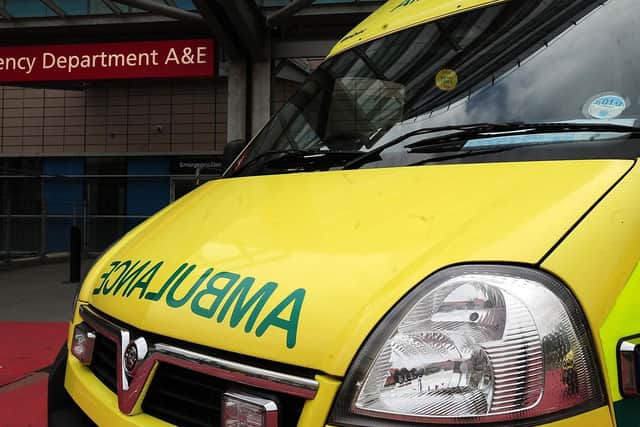North West Ambulance staff at 'wits end' with callouts up to 40 minutes away, unions say
and live on Freeview channel 276
Health unions GMB Unison, Unite and the Royal College of Nursing (RCN) accused NWAS Trust of "failing both patients and staff."
It comes after the Trust introduced a new system for deploying ambulances, known as EOC0001, which sees any ambulance within 40 minutes being immediately assigned for category two calls.
Advertisement
Hide AdAdvertisement
Hide AdThe calls are classed as an emergency for a potentially serious condition that may require rapid assessment, urgent on-scene intervention and/or urgent transport.


But with the Trust covering the entire North West region, ambulances may end up driving for miles to an emergency - only to be relieved by a more local, closer team.
Unions said ambulance crews are at their wits end and exhausted, after being sent to calls up to 30 miles away to respond to an emergency, only to be diverted to another call back from the area they were originally.
Trade union GMB said it was "clear there aren't enough ambulances to meet this demand."
Advertisement
Hide AdAdvertisement
Hide AdSteve Rice, GMB branch secretary, said: “Our members are on edge and at their wits end, it’s an exhausting way to expect us to work.
“This move has seen each vehicle seeing less patients as running times increase, taken away dispatcher’s autonomy to control and gives very little or no thought to staff safety.
“The issue is this system just doesn’t prioritise getting someone to the incident quickly, it just incentivises assigning the case quickly. It fails both patients and staff.
“This situation can’t hold, and the trust need to end this practice immediately to protect ambulance staff and enable constructive dialogue to take place."
Advertisement
Hide AdAdvertisement
Hide AdJeff Gorman, UNISON branch secretary, added: "UNISON has serious concerns about the introduction of EOC0001.
“Our members are telling us that they are spending most of their shift responding to 999 calls that are on occasions in excess of 40 minute travel time, only to be stood down and sent to another 999 call that is back where they started off from, sometimes actually passing addresses that are waiting for an ambulance and they are not actually seeing patients as a result of this.
“We believe that this is putting patients at risk and is detrimental to the health and wellbeing of our members."
The Royal College of Nursing said it was "deeply concerned" about the deployment procedure, and urged NWAS Trust to work with unions representing ambulance staff.
Advertisement
Hide AdAdvertisement
Hide AdEstephanie Dunn, regional director for the RCN in the North West, said: “The RCN is deeply concerned about the introduction of these measures and the inevitable impact on the health and wellbeing of staff at NWAS.
“Many of our members are on the end of the phone dealing with the callers and any delay in attending a patient will add pressure to what might be a very distressing situation for the caller. We fully expect that staff will face abuse due to stress and frustration. It is imperative staff are protected from this and we call upon management to intervene and support their psychological safety.
“Moreover, patient safety is paramount and we believe this will be put at risk from increased wait times should this proposal be implemented. We urge NWAS to work with all of the Unions representing staff at the Trust to listen and work with us.”
NWAS Trust said the procedure had been in place for over a year, in a bid to prevent patients from waiting too long in an emergency if nearby teams are unavailable.
Advertisement
Hide AdAdvertisement
Hide AdChris Grant, Medical Director for NWAS, said: “This procedure, known as EOC0001, has been in operation for over 12 months and allows ambulance crews to travel up to 40 minutes to attend a category two incident – these are serious, but not immediately life-threatening incidents including strokes, seizures and burns.
"Due to the Trust facing a significant increase in 999 demand, and the reporting of longer waits, fully implementing the procedure is realising improvements for patients.
“Because of the large volume of these calls, these patients are frequently waiting longer than they should for a response – this can lead to a rise in the number of serious untoward incidents (SUIs).
“EOC0001, allows us to send resources to which are further away rather than wait for a closer resource to become available, and so far the results are positive with less reported SUIs for this category.
Advertisement
Hide AdAdvertisement
Hide Ad“We do understand the view that some staff will be travelling for longer to reach the patients but those patients need us and in all consciousness, we cannot deny those individuals a faster response during their time of need, when there are available resources just that little bit further away or out of the area.”